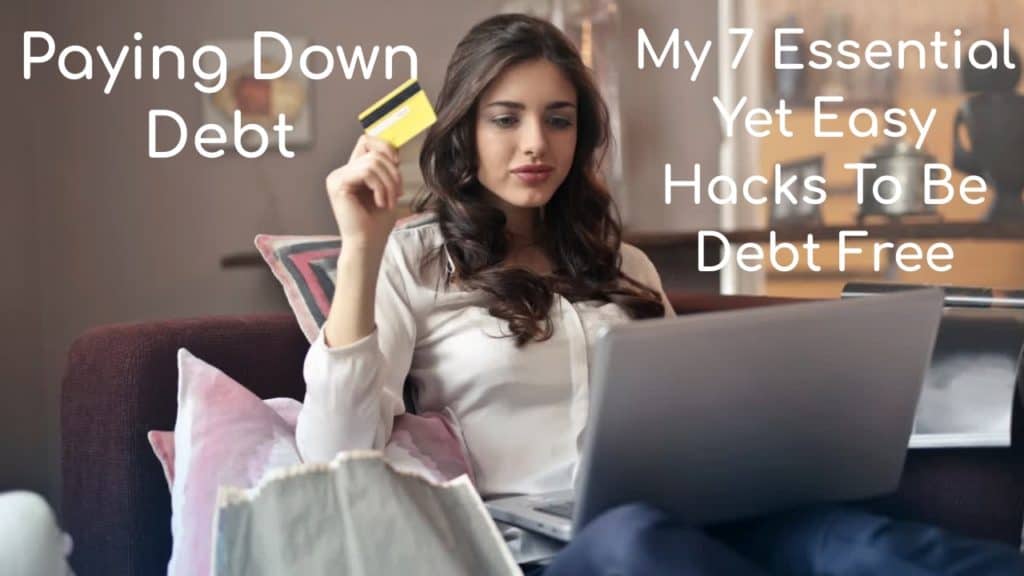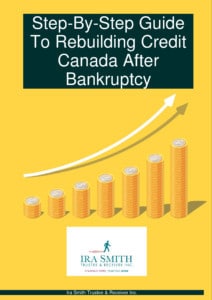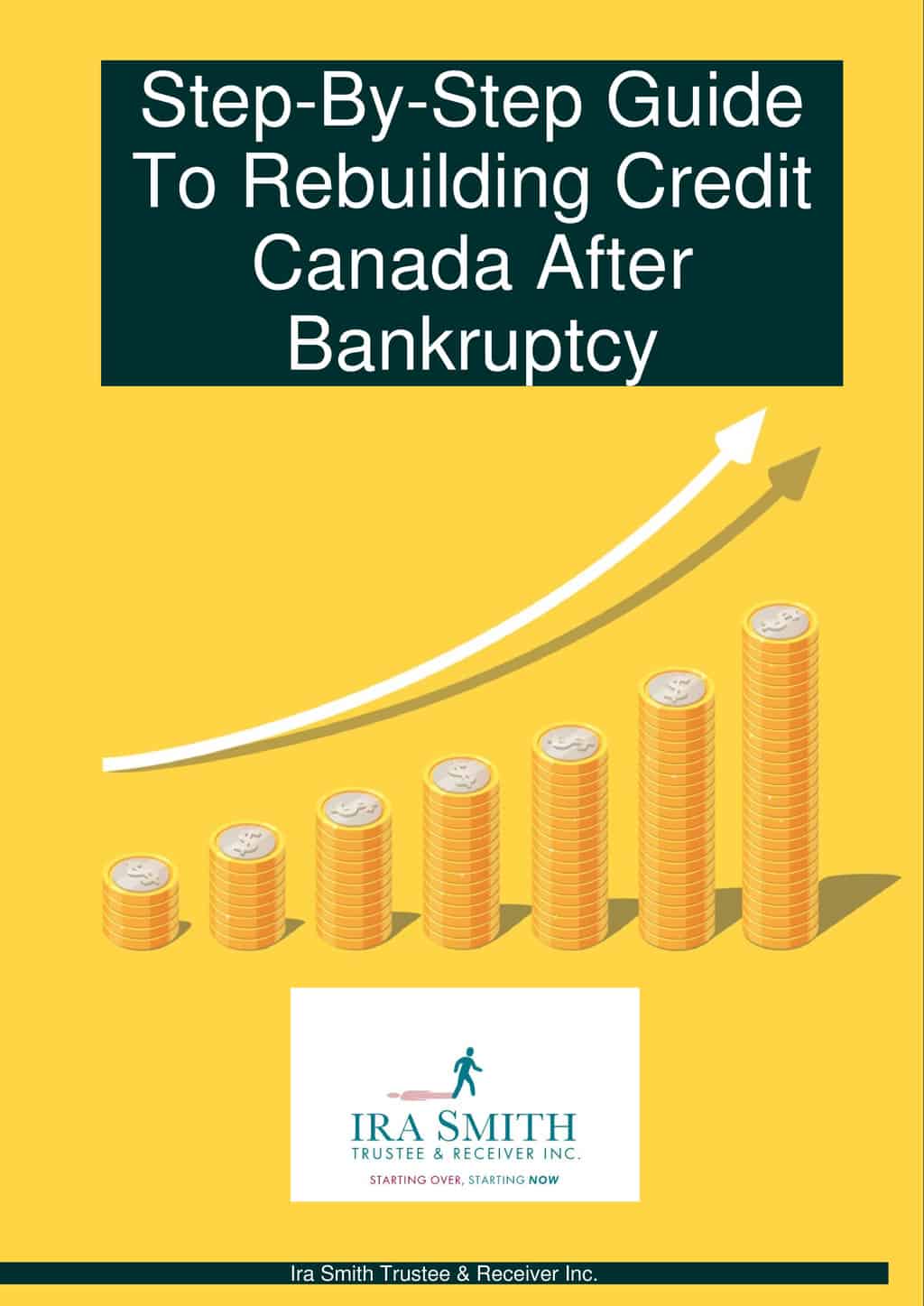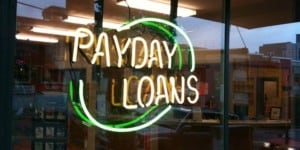The Ira Smith Trustee Team hopes that you and your family had a restful holiday season and that you are all safe, healthy and secure.
Ira Smith Trustee & Receiver Inc. is absolutely operational and Ira, in addition to Brandon Smith, is readily available for a telephone consultation or video meeting.
If you would prefer to listen to the audio version of this paying down debt Brandon’s Blog, please scroll to the bottom of the page and click play on the podcast
Paying down debt No. 1 financial goal of Canadians for 2021: Poll
A new survey states paying down debt is the #1 economic objective of Canadians to focus on heading right into the brand-new year. Many claimed that they handled more financial and high-interest debt this year to cover day-to-day expenditures and also offset a loss of revenue.
The annual CIBC poll says having a debt repayment plan has actually continued to be the top financial priority for the past 11 years. Unfortunately, what this says is that even without a COVID-19 pandemic, Canadians have been largely unable to do so. Everyone can be excused for 2020. Canadians have been grappling this past year with the financial and health challenges because of the coronavirus.
The purpose of this paying down debt Brandon Blog is to discuss the survey results and provide some tips on how to tackle debt that needs to be paid down. I truly believe that it is not your fault that you have not been able to be successfully paying down debt. You have only been shown the old ways that do not work anymore. Below I describe my 7 easy hacks for paying down debt. It is a new way of getting into the habit. It is a process that you can set up, track and see how you progress.
The survey found the 2nd monetary top priority of Canadians for 2021 after paying down debt is merely keeping up with bills as well as getting by. The survey showed that on average, Canadians expect a positive economic outlook for 2021. The poll results indicate that 24% of Canadians believe their financial position will certainly get better in 2021. This is down from 32% in 2019.
The poll also found the top economic issues facing Canadians in 2021 consist of the rising cost of living, the increased prices of goods and a sluggish economy.
Carissa Lucreziano, vice-president of CIBC Financial and Investment Advice, claims it is reasonable that Canadians are worried given the economic climate of 2020. She states the best buffer is to be prepared with a plan to satisfy your financial objectives, which includes a realistic estimate for paying down debt, that can be readjusted when situations alter.
How Debt Affects Your Credit Scores
The first thing you should know is that debts have a ripple effect across your whole financial life, including your credit history.
Revolving financial obligations includes a line of credit or credit card debt where you can churn, or rotate, a balance from month to month. You can obtain as much credit as you like up to an established credit limit. Interest is charged on any outstanding balance that is not fully repaid by the due date. Your regular monthly payment can differ on revolving debt based on your outstanding fluctuating balance.
Fixed financial debt includes mortgages, auto loans, personal loans and student loans. Most of the time, the amount of money you borrow, rates of interest, the monthly due date and the size of your monthly payment are fixed and known at the start.
With both revolving and fixed financial debts, you must pay promptly. When you miss a payment, your loan provider will report it to one of the two Canadian credit bureaus: Equifax and TransUnion. The credit bureau reporting of late payments can remain on your credit records for 7 years. When you miss a scheduled payment, you not only still owe that amount, but you will also have to pay late or default fees. Now the debt costs you even more!
Besides your payment history, there are other ways each type of financial obligation influences your credit score. With fixed installment debt, having a high outstanding amount does not have a huge effect on your credit score.
Rotating debt is a different story. If you are using a high percentage of your available credit from month to month, it will likely have an adverse result on your credit report and credit score. This is particularly true if you are doing it with numerous credit cards.
Your credit score will be negatively influenced because by using a large percentage of your available revolving credit, your credit utilization score is high. Credit utilization has considerable influence in calculating your credit score. So to keep your revolving debt outstanding as low as possible compared to your authorized credit, ideally, you ought to be paying down debt fully every month.
Why Credit Card Debt Is So Dangerous: My paying down debt calculator
When it comes to financial obligations, credit card debt is usually the most wicked.
Credit card companies can tempt you in with a low initial annual percentage rate (APR) and flashy credit limit. However, that introductory APR deal will ultimately end. When it does, you can find yourself looking at a frustrating heap of financial debt if you really did not handle your new charge card account properly. The reason revolving financial debt can be so frustrating is due to the fact that credit card interest rates are usually very high.
So, if you’re just making the minimum payment each month, it will certainly take you a long time to paying down debt. It could potentially take decades due to the interest accumulation.
Let’s say you put $15,000 on a credit card with a 19.9% APR, and then cut it up. You never get a replacement card and never spend another penny on that account. It is normal for a Canadian credit card to have a minimum monthly payment of 3% of the outstanding balance.
If all you do is make the minimum monthly payment, assuming you maintain the original minimum monthly payment as your balance declines, it will take you 25 years to pay off the full amount. You will also be paying more than double the amount you charged on the card. Here is the math:
| Credit card balance | $15,000.00 |
| Credit card APR | 19.9% |
| Minimum payment | 3% |
| Monthly payment | $450.00 |
| Balance payoff | 300 months |
| Total payments | $33,156.26 |
As you can see, paying down credit card debt this way is very expensive and I have not yet met a person who is comfortable paying down debt over 25 years, other than for perhaps the mortgage on their home.
How Personal Loans Impact Credit Scores
Personal loans also influence your credit score. Whether the loan account one-day damages or improves your score depends on 2 primary aspects: (i) exactly how you take care of the account and what else your credit history shows.
Too many applications could injure your score. That is because when you make an application for credit, an inquiry is logged onto your credit report. Too many such inquiries can damage your rating. The reason is that with more than one application close together in time, the formula assumes that you need the money and at least the inquiries before the last one turned you down.
Your credit might increase as your personal loan ages and there are no negative notations about missed payments. Initially, a new account could lessen your credit score. As your personal loan gets older and remains current, it shows you are using that debt responsibly. That can help your numbers.
A fixed personal loan might reduce your credit usage. Individual loans are fixed installment financings, which do not affect your revolving application ratio in any way. You can have a high balance on a fixed personal loan. If you pay off credit cards with a fixed installment personal loan, then your revolving utilization ratio must reduce. Over time, as long as you don’t get the credit card balances back up there and have the new personal loan outstanding, this can improve your credit score.
Your credit blend could also be enhanced with a personal loan. The credit scoring formula rewards you for having a diverse combination of accounts on your credit report. If you do not have any installment borrowing on your report, getting a fixed installment personal loan may improve your credit score. You just have to make sure that you are making your monthly payments on time for paying down debt. If not, it will damage and not help your score.

7 hacks for paying down debt quickly
Hack 1 – This is my first step to ending up being totally debt-free. This is important prior to anything else. You need to get some quiet time and start to make you’re coming to be debt-free goals real. It is a process that anyone can learn. Making those goals real does not suggest merely thinking them out for 5 seconds. What will you do daily when you are debt-free? What will it feel like? How will your life be changed? How will you feel? Write out this story on a notepad or better still a vision board. After that follow the rest of the steps below to begin to focus on your paying down debt strategy.
Hack 2 – Just how much do you intend to pay off in three months? In six months? You will make use of the steps discussed below to produce these objectives. The recommendation is that you have some shorter-term goals of just how much to save and therefore just how much debt to pay back.
These shorter-term goals need to feed into your longer-term objective. They’re easier to get to than the full objective. They also will certainly inspire you to keep going when you reach them. With your short-term objectives clear, it is time to prepare your month-to-month spending plan. It is a strategy of writing down where your money comes from and where your money is going.
You need to take the time to jot down every source of revenue you have and just how much comes from each one. You likewise need to identify and also write down where the money is going – line by line. As soon as you have done that, you can figure out where you can really decide if you can do any other activities to bring in more and what spending you can cut out. This will get you onto a savings plan, which will then give you the extra money to let you begin paying down debt.
I know I may have just lost fifty percent of you. This isn’t a budgeting blog site in itself. You have to create your budget plan on your own. I have written other blogs on the subject of budgeting which you can read here.
Hack 3 – I like fast small flares for saving cash. It will also reveal a great deal concerning the way you spend money. Start cutting back on things from your budget plan you have control over. Things like clothing purchases, eating out at restaurants (pre-pandemic) and other entertainment. I would hazard a guess that since the lockdowns and self-quarantining began last March, you have spent less on these types of spending than the year before. Go track it from your credit card statements, I bet you will see that is the case.
You can test on your own how to lower that spending in half or eliminate it out completely over the next 2 months. I am not discussing going cold turkey and not spending anything. I am speaking about a short-term challenge of a couple of months and on 1 or 2 spending things at a time.
These spending challenges work on so many levels. I am sure you will love them just like me. By only taking one or two items off of your spending, you are not attempting to save every dime.
You can still spend. You are simply trying out cutting down on a couple of things each time. Besides saving a lot of cash, this is going to reveal to you what you do not really care about in the spending side of your budget. You will now easily have gotten into the habit of not spending money on those things. You will now have savings in the form of extra money that you can use for meeting your paying down debt goals.
What is also great is that 8 weeks is right around the time it takes to construct brand-new behaviour patterns and breaks old habits. Those brand-new practices are most likely to drive you and help you feel that saving is not as difficult as you originally thought it would be. Maintaining these brand-new spending and saving behaviours is just one of the tricks for paying down debt.
How to get out of debt on a low income
Hack 4 – Next is doing a complete decluttering. Don’t worry, I assure you it’s a lot easier than it seems. You just have to get started. Go room-to-room in your residence and itemize every little thing you do not need. Specifically, those things you have not used in a long time. Set a rule such as have I used this, worn it or looked at it in the last 5 years? If the answer is no, out it goes. Do not second guess yourself. Stick to the rule.
This could include the treadmill you might have used only in the first 3 months after you got it, the out-of-date clothes that you never wear or the furniture you never ever rest on. Anything that isn’t being made use of or making your life better, offer it for sale online.
Not only are you making a little cash to help with your paying down debt. You are ridding yourself of something you do not need and someone who will enjoy it as much as you used to.
You may find that with some of the items, you could have squandered your money getting some of these things. But that was in the past. We are now only looking forward. It will also be a good memory to have the next time you think you need to buy something. I am sure you will analyze all future buying decisions differently.
Hack 5 – This is going to be another hard decision. However, it is one that a lot of people just have to do if they are serious about paying down debt. That is taking a sober look at how you travel every day.
I like seeing or paying attention to people talking about how much financial debt they have. What always astonishes me is the number of people who have a reasonable brand-new vehicle with monthly payments they do not have the money or budget to support. Seriously, people simply do not seem to see exactly how a high regular monthly auto payment is trashing their spending plan!
Besides the payment itself, insurance, licensing and maintenance costs come with the vehicle. I am not saying you cannot have nice things or that you need to never ever get a brand-new car or truck. Perhaps a clean vehicle in good condition that just came off a 3-year lease would be extra affordable and save you cash.
Appreciate your money! We do not have a great deal of time on this earth and you have to enjoy it. However, you can’t appreciate life if you’re constantly stressed out from your debt. So have a close look at what is parked in the driveway and be honest with yourself. Can really afford it?
By following this logic you will have extra cash each month that you can allocate to paying down debt.
Hack 6 – This tip most likely will eliminate lifestyle creep. Lifestyle creep is how your spending appears to increase every time your revenue does. The result is you are always stuck in paycheque-to-paycheque mode and are never paying down debt.
Just how is it that we get tax refunds or a raise, we never have enough that amount saved? You work overtime but the cash just appears to vaporize into thin air. It is the problem of lifestyle creep. Our spending plan always seems to grow to eat up whatever income there is.
Fighting lifestyle creep suggests referring back and monitoring your budget on a regular basis. Plug in that refund or additional income on an after-tax basis. Remind yourself how much you are spending. This will let you take that initiative to not spend even more if you now have a little extra. The very best thing to do is to designate that additional money for paying down debt and then to do it right away.
By having a place for that money, it stops being a temptation to spend it. It may not seem like it will conserve much however you would be surprised just how quickly normal smaller amounts will build up over time.
Hack 7 – My last money-saving method is going to put a freeze on your credit cards. Make the essential payments you have budgeted for by using cash. You simply do not obtain that very same psychological and emotional sensation when you use a credit card that you obtain when you pay with cash. When you pay with cash, you feel the purchase. Not so much with a credit card.
I’m not saying to cut up your cards. I have a credit card I use for company spending purposes and another for personal use. It is also handy to have one for emergencies if you do not have an extra money reserve yet from your savings. Stopping the use of your bank card will still keep that alternative open yet it makes you reassess your spending on practically every product.
Simply put, these 7 money-saving hacks will give you thousands of dollars over time. You can use that money first for paying down debt. Once your debts are paid off, keep up those same habits to build up savings for investment and ultimately your retirement. Each hack is simple yet effective. You will love to see how quickly you can make progress in paying down debt. Each one is not a major step, but combined together, they will have a profound effect on your debt payment plan.
Paying down debt: Do you want an avalanche of snowballs?
The 7 simple hacks I describe above gets you the cash to use to pay down your debt. Now you actually have to do it. I am sure that you have heard of the two highly touted methods of actually paying down debt being the: (i) debt avalanche method; and (ii) debt snowball method. Dave Ramsey, a US financial commentator, is a strong proponent of these methods.
Here is a summary of the two methods for paying down debt. In the debt avalanche method, you pay off your debt with the greatest rate of interest initially, 2nd greatest next and so forth. In the debt snowball method, you pay off the single debt in total with the smallest outstanding balance first, second smallest 2nd and so forth.
The debt avalanche approach of paying down debt approaches the matter from a financial perspective. The snowball method is more psychological. Both get you to reduce your debt. Both help you reach your financial goal.
If you would like more details on both the debt avalanche and snowball payment plan methods of paying down debt, read my March 2019 blog – Debt Help Near Me: Our Toronto Debt Repayment Calculator Strategy.
Can I book a meeting with someone who can help?
Of course, you can. Contact the Ira Smith Team for your no-cost consultation. We can start helping you immediately getting into a pattern of paying down debt.
I hope you enjoyed this paying down debt Brandon Blog post. If you are concerned because you or your business are dealing with substantial debt challenges and you assume bankruptcy is your only option, call me. It is not your fault that you remain in this way. You have actually been only shown the old ways to try to deal with financial issues. These old ways do not work anymore. The Ira Smith Team utilizes new modern-day ways to get you out of your debt difficulties while avoiding bankruptcy. We can get you the relief you need and so deserve.
The tension put upon you is big. We know your discomfort factors. We will check out your entire situation and design a new approach that is as unique as you and your problems; financial and emotional. We will take the weight off of your shoulders and blow away the dark cloud hanging over you. We will design a debt settlement strategy for you. We know that we can help you now.
We understand that people and businesses facing financial issues need a realistic lifeline. There is no “one solution fits all” method with the Ira Smith Team. Not everyone has to file bankruptcy in Canada. The majority of our clients never do. We help many people and companies stay clear of bankruptcy.
That is why we can establish a new restructuring procedure for paying down debt that will be built just for you. It will be as one-of-a-kind as the economic issues and discomfort you are encountering. If any one of this seems familiar to you and you are serious about getting the solution you need, contact the Ira Smith Trustee & Receiver Inc. group today.
Call us now for a no-cost consultation.
We will get you or your business back up driving to healthy and balanced trouble-free operations and get rid of the discomfort factors in your life, Starting Over, Starting Now.
The Ira Smith Trustee Team hopes that you and your family had a restful holiday season and that you are all safe, healthy and secure.
Ira Smith Trustee & Receiver Inc. is absolutely operational and Ira, in addition to Brandon Smith, is readily available for a telephone consultation or video meeting.









